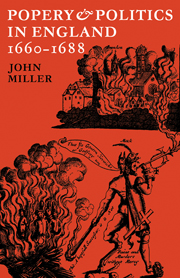Book contents
- Frontmatter
- Contents
- Preface
- Abbreviations
- Note on spellings and dates
- Introduction
- 1 The Catholic laity
- 2 England and Rome: the Catholic clergy
- 3 The penal laws and their enforcement
- 4 The development of the anti-Catholic tradition
- 5 The Restoration settlement and after
- 6 The French alliance and ‘Catholicity’
- 7 York and Danby
- 8 The Popish Plot and the Exclusion Crisis
- 9 The Tory reaction
- 10 James II and the Church of England Men
- 11 James II and the Dissenters
- 12 James II and Rome
- 13 The missionary effort under James II
- 14 The opposition to James II
- Appendices
- Select Bibliography
- Index
6 - The French alliance and ‘Catholicity’
Published online by Cambridge University Press: 07 October 2011
- Frontmatter
- Contents
- Preface
- Abbreviations
- Note on spellings and dates
- Introduction
- 1 The Catholic laity
- 2 England and Rome: the Catholic clergy
- 3 The penal laws and their enforcement
- 4 The development of the anti-Catholic tradition
- 5 The Restoration settlement and after
- 6 The French alliance and ‘Catholicity’
- 7 York and Danby
- 8 The Popish Plot and the Exclusion Crisis
- 9 The Tory reaction
- 10 James II and the Church of England Men
- 11 James II and the Dissenters
- 12 James II and Rome
- 13 The missionary effort under James II
- 14 The opposition to James II
- Appendices
- Select Bibliography
- Index
Summary
Charles II's alliance with Louis XIV and his promise in the Secret Treaty of Dover to declare himself a Catholic have received much attention from ‘Whig’ historians. Here, they said, was proof positive of Charles's political and religious depravity: a Papist in all but name, he entered into an unholy alliance with the epitome of absolutism and militant Catholicism, with the aim of crushing English parliaments, liberties and religion. The promise to turn Catholic was seen as central to Charles's political strategy, as the corollary of his alleged desire to create an English absolute monarchy. The aim of this chapter is to argue that this view is wrong and that the promise of ‘Catholicity’ was a temporary and comparatively unimportant tactical move in the negotiations for an Anglo-French alliance, the main purpose of which was a joint war against the Dutch. The alliance and the war were acceptable to all Charles's leading ministers, the notorious ‘Cabal’, who agreed on little else. The earl of Arlington, the former Sir Henry Bennet, was concerned primarily to maintain the king's favour and to this end he suppressed his own pro-Dutch feelings. Lord Ashley's main concerns at this time were commerce and the securing of toleration for Protestant Dissenters. The duke of Buckingham was also an advocate of toleration for Dissenters, but apart from that he was politically inconsistent, concerned mainly with his own aggrandisement and the destruction of his rivals at court.
- Type
- Chapter
- Information
- Popery and Politics in England 1660–1688 , pp. 108 - 120Publisher: Cambridge University PressPrint publication year: 1973



